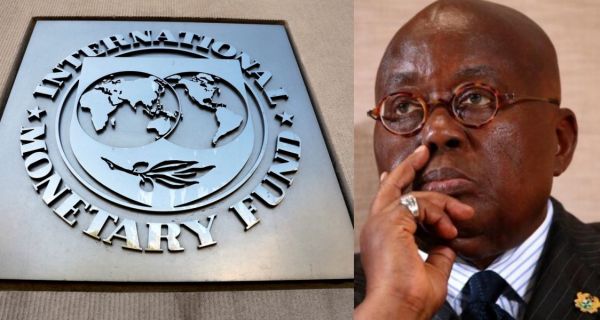Ghana, one of the world’s biggest producers of both gold and cocoa, is suffering its worst economic crisis in a generation, with the price of goods rising at an average of 41% over the past year.
It has just signed a new bailout programme with the International Monetary Fund (IMF) worth $3bn (£2.4bn) over three years to help ease the problems and is expected to receive the first tranche of $600m soon, but how much difference will that make?
Why is the economy in such a mess?
Ghana, long seen as one of Africa’s best run countries, has been struggling to recover from the combined effects of the global Covid pandemic and the war in Ukraine.
President Nana Akufo Addo himself admitted last October that the country was “in crisis” citing “malevolent forces [that] have come together at the same time”.
But the opposition also blames the crisis on what it calls the “gross mismanagement” of the economy – an allegation the government has denied.
The rate at which the price of goods is rising, or inflation, is on a downward path, but it is still very high at 41% and many families are battling to make ends meet.
The size of Ghana’s debt is now almost 90% of the total annual value of its economy. The government had defaulted in the payment of its loans, and it had to restructure its debt with creditors to qualify for the IMF bailout.
The country’s foreign reserves are virtually empty, making it hard to pay for imports which are usually priced in US dollars.
It is in this context that many Ghanaians have been feverishly waiting for this IMF bailout programme.
But this is the 17th time since independence more than six decades ago that Ghana has opted for an IMF programme.
So will the IMF loan make any difference?
Despite being one of the world’s biggest producers of cocoa and the leading producer of gold in Africa, one of Ghana’s basic problems is that it does not earn enough through exports to pay for everything it imports.
This is known as the balance of payments deficit and is partly what the IMF loan is designed to help with. But that is not all.
The programme is also expected to significantly slow the rate of inflation and ensure a stable local currency. All of this will benefit ordinary Ghanaians through stable prices of basic commodities including imported ones.
It has been considered risky to lend money to Ghana, but with the new IMF programme it should mean that the country can borrow again to implement its policies.
But, as the Reuters news agency reports, it may still have to deal with lengthy negotiations with creditors if Zambia’s experience is anything to go by.
Development partners, including the World Bank, have promised to help the country come out of its economic quagmire, while investors are now likely to return without fear of losing their money.
However, if past experience is anything to go by, this cash injection from the IMF will not necessarily solve the country’s long-term economic problems.
Ghana only exited the last IMF programme in 2019 and is already asking for more money.
Analysts have attributed this regular pattern to mismanagement by successive governments over the years.
This new bailout programme is for a maximum period of three years and after that, many are asking whether things will get bad again.
Although many Ghanaians believe the bailout will address current challenges, it will not lead to poverty reduction, job creation or salary increases, says economist Professor Godfred Bokpin of the University of Ghana.
He adds that the biggest challenge to implementing the IMF programme will be next year when Ghana goes to the polls.
Governments in Ghana have a history of massively increasing spending ahead of elections – in order to show voters what a good job they’re doing, even if they don’t always have the money.
“The government will want to spend and the programme will not allow them, so they either abandon the programme or they trade off the elections,” says Prof Bokpin.
“It will be interesting to see how the IMF programme will be able to hold back politicians from spending excessively during the elections.”
What does it mean for taxes and spending?
For now, the government is trying to boost its revenue with new taxes on things like cigarettes, sweet drinks, spirits and wine, as well as an increase in income tax – all of which will hit some pockets hard.
The government admits that the IMF programme is not a panacea.
“We have other programmes to help us to bring back growth, help the private sector and get the cost of living under control,” Information Minister Kojo Oppong Nkrumah said.
He told the BBC that the government had plans to boost industry and agriculture and create more jobs. But the opposition National Democratic Congress remains sceptical.
The finance minister may also have to look at how to reduce government spending, but officials have told the BBC that poverty reduction policies will not be compromised.
Source: Thomas Naadi/ BBC News, Accra
| Disclaimer: Opinions expressed here are those of the writers and do not reflect those of Peacefmonline.com. Peacefmonline.com accepts no responsibility legal or otherwise for their accuracy of content. Please report any inappropriate content to us, and we will evaluate it as a matter of priority. |
Featured Video















